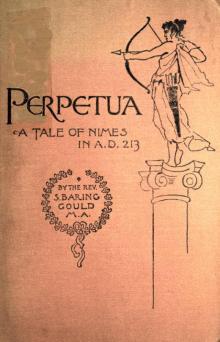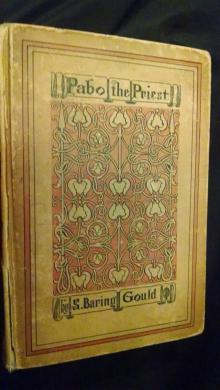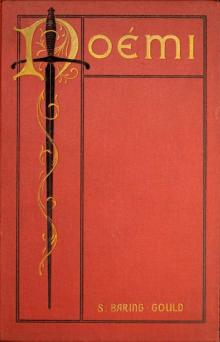- Home
- S. Baring-Gould
The Book of Were-Wolves Page 7
The Book of Were-Wolves Read online
Page 7
CHAPTER VIII.
FOLK-LORE RELATING TO WERE-WOLVES.
Barrenness of English Folk-lore--Devonshire Traditions--Derivation of Were-wolf--Cannibalism in Scotland--The Angus Robber--The Carle of Perth--French Superstitions--Norwegian Traditions--Danish Tales of Were-wolves--Holstein Stories--The Werewolf in the Netherlands--Among the Greeks; the Serbs; the White Russians; the Poles; the Russians--A Russian Receipt for becoming a Were-wolf--The Bohemian Vlkodlak--Armenian Story--Indian Tales--Abyssinian Budas--American Transformation Tales--A Slovakian Household Tale--Similar Greek, Béarnais, and Icelandic Tales.
ENGLISH folk-lore is singularly barren of were-wolf stories, the reason being that wolves had been extirpated from England under the Anglo-Saxon kings, and therefore ceased to be objects of dread to the people. The traditional belief in were-wolfism must, however, have remained long in the popular mind, though at present it has disappeared, for the word occurs in old ballads and romances. Thus in Kempion--
O was it war-wolf in the wood?
Or was it mermaid in the sea?
Or was it man, or vile woman,
My ain true love, that mis-shaped thee?
There is also the romance of William and the Were-wolf in Hartshorn; %note%1 but this professes to be a translation from the French:--
[1. HARTSHORN: Ancient Metrical Tales, p. 256. See also "The Witch Cake," in CRUMEK'S Remains of Nithsdale Song.]
For he of Frenche this fayre tale ferst dede translate,
In ese of Englysch men in Englysch speche.
In the popular mind the cat or the hare have taken the place of the wolf for witches' transformation, and we hear often of the hags attending the devil's Sabbath in these forms.
In Devonshire they range the moors in the shape of black dogs, and I know a story of two such creatures appearing in an inn and nightly drinking the cider, till the publican shot a silver button over their heads, when they were instantly transformed into two ill-favoured old ladies of his acquaintance. On Heathfield, near Tavistock, the wild huntsman rides by full moon with his "wush hounds;" and a white hare which they pursued was once rescued by a goody returning from market, and discovered to be a transformed young lady.
Gervaise of Tilbury says in his Otia Imperalia--
"Vidimus frequenter in Anglia, per lunationes, homines in lupos mutari, quod hominum genus gerulfos Galli vocant, Angli vero wer-wlf, dicunt: wer enim Anglice virum sonat, wlf, lupum." Gervaise may be right in his derivation of the name, and were-wolf may mean man-wolf, though I have elsewhere given a different derivation, and one which I suspect is truer. But Gervaise has grounds for his assertion that wér signifies man; it is so in Anglo-Saxon, vair in Gothic, vir in Latin, verr, in Icelandic, vîra, Zend, wirs, old Prussian, wirs, Lettish, vîra, Sanskrit, bîr, Bengalee.
There have been cases of cannibalism in Scotland, but no bestial transformation is hinted at in connection with them.
Thus Bœthius, in his history of Scotland, tells us of a robber and his daughter who devoured children, and Lindsay of Pitscottie gives a full account.
"About this time (1460) there was ane brigand ta'en with his haill family, who haunted a place in Angus. This mischievous man had ane execrable fashion to take all young men and children he could steal away quietly, or tak' away without knowledge, and eat them, and the younger they were, esteemed them the mair tender and delicious. For the whilk cause and damnable abuse, he with his wife and bairns were all burnt, except ane young wench of a year old who was saved and brought to Dandee, where she was brought up and fostered; and when she came to a woman's years, she was condemned and burnt quick for that crime. It is said that when she was coming to the place of execution, there gathered ane huge multitude of people, and specially of women, cursing her that she was so unhappy to commit so damnable deeds. To whom she turned about with an ireful countenance, saying:--'Wherefore chide ye with me, as if I had committed ane unworthy act? Give me credence and trow me, if ye had experience of eating men and women's flesh, ye wold think it so delicious that ye wold never forbear it again.' So, but any sign of repentance, this unhappy traitor died in the sight of the people." %note%1
[1. LINDSAY'S Chronicles of Scotland, 1814, p. 163.]
Wyntoun also has a passage in his metrical chronicle regarding a cannibal who lived shortly before his own time, and he may easily have heard about him from surviving contemporaries. It was about the year 1340, when a large portion of Scotland had been devastated by the arms of Edward III.
About Perth thare was the countrie
Sae waste, that wonder wes to see;
For intill well-great space thereby,
Wes nother house left nor herb'ry.
Of deer thare wes then sic foison (profusion),
That they wold near come to the town,
Sae great default was near that stead,
That mony were in hunger dead.
A carle they said was near thereby,
That wold act settis (traps) commonly,
Children and women for to slay,
And swains that he might over-ta;
And ate them all that he get might;
Chwsten Cleek till name behight.
That sa'ry life continued he,
While waste but folk was the countrie. %note%1
[1. WYNTOUN'S Chronicle, ii. 236.]
We have only to compare these two cases with those recorded in the last two chapters, and we see at once how the popular mind in Great Britain had lost the idea of connecting change of form with cannibalism. A man guilty of the crimes committed by the Angus brigand, or the carle of Perth, would have been regarded as a were-wolf in France or Germany, and would have been tried for Lycanthropy.
S. Jerome, by the way, brought a sweeping charge against the Scots. He visited Gaul in his youth, about 880, and he writes:--"When I was a young man in Gaul, I may have seen the Attacotti, a British people who live upon human flesh; and when they find herds of pigs, droves of cattle, or flocks of sheep in the woods, they cut off the haunches of the men and the breasts of the women, and these they regard as great dainties;" in other words they prefer the shepherd to his flock. Gibbon who quotes this passage says on it: "If in the neighbourhood of the commercial and literary town of Glasgow, a race of cannibals has really existed, we may contemplate, in the period of the Scottish history, the opposite extremes of savage and civilized life. Such reflections tend to enlarge the circle of our ideas, and to encourage the pleasing hope that New Zealand may produce in a future age, the Hume of the Southern hemisphere."
If traditions of were-wolves are scanty in England, it is quite the reverse if we cross the water.
In the south of France, it is still believed that fate has destined certain men to be lycanthropists--that they are transformed into wolves at full moon. The desire to run comes upon them at night. They leave their beds, jump out of a window, and plunge into a fountain. After the bath, they come out covered with dense fur, walking on all fours, and commence a raid over fields and meadows, through woods and villages, biting all beasts and human beings that come in their way. At the approach of dawn, they return to the spring, plunge into it, lose their furry skins, and regain their deserted beds. Sometimes the loup-garou is said to appear under the form of a white dog, or to be loaded with chains; but there is probably a confusion of ideas between the were-wolf and the church-dog, bar-ghest, pad-foit, wush-hound, or by whatever name the animal supposed to haunt a churchyard is designated.
In the Périgord, the were-wolf is called louléerou. Certain men, especially bastards, are obliged at each full moon to transform themselves into these diabolic beasts.
It is always at night that the fit comes on. The lycanthropist dashes out of a window, springs into a well, and, after having struggled in the water for a few moments, rises from it, dripping, and invested with a goatskin which the devil has given him. In this condition, the louléerous run upon four legs, pass the night in ranging over the country, and in biting and devouring all the dogs they meet. A
t break of day they lay aside their goatskins and return home. Often they are ill in consequence of having eaten tough old hounds, and they vomit up their undigested paws. One great nuisance to them is the fact that they may be wounded or killed in their louléerou state. With the first effusion of blood their diabolic covering vanishes, and they are recognized, to the disgrace of their families.
A were-wolf may easily be detected, even when devoid of his skin; for his hands are broad, and his fingers short, and there are always some hairs in the hollow of his hand.
In Normandy, those who are doomed to be loups-garoux, clothe themselves every evening with a skin called their hère or hure, which is a loan from the devil. When they run in their transformed state, the evil one accompanies them and scourges them at the foot of every cross they pass. The only way in which a werewolf can be liberated from this cruel bondage, is by stabbing him three times in the forehead with a knife. However, some people less addicted to allopathic treatment, consider that three drops of blood drawn by a needle, will be sufficient to procure release.
According to an opinion of the vulgar in the same province, the loup-garou is sometimes a metamorphosis forced upon the body of a damned person, who, after having been tormented in his grave, has torn his way out of it. The first stage in the process consists in his devouring the cerecloth which enveloped his face; then his moans and muffled howls ring from the tomb, through the gloom of night, the earth of the grave begins to heave, and at last, with a scream, surrounded by a phosphorescent glare, and exhaling a fœtid odour, he bursts away as a wolf.
In Le Bessin, they attribute to sorcerers the power of metamorphosing certain men into beasts, but the form of a dog is that principally affected by them.
In Norway it is believed that there are persons who can assume the form of a wolf or a bear (Huse-björn), and again resume their own; this property is either imparted to them by the Trollmen, or those possessing it are themselves Trolls.
In a hamlet in the midst of a forest, there dwelt a cottager named Lasse, and his wife. One day he went out in the forest to fell a tree, but had forgot to cross himself and say his paternoster, so that some troll or wolf-witch (varga mor) obtained power over him and transformed him into a wolf. His wife mourned him for many years, but, one Christmas-eve, there came a beggar-woman, very poor and ragged, to the door, and the good woman of the house took her in, fed her well, and entreated her kindly. At her departure the beggar-woman said that the wife would probably see her husband again, as he was not dead, but was wandering in the forest as a wolf. Towards night-fall the wife went to her pantry to place in it a piece of meat for the morrow, when, on turning to go out, she perceived a wolf standing before her, raising itself with its paws on the pantry steps, regarding her with sorrowful and hungry looks. Seeing this she exclaimed, "If I were sure that thou wert my own Lasse, I would give thee a bit of meat." At that instant the wolf-skin fell off, and her husband stood before her in the clothes he wore on the unlucky morning when she had last beheld him.
Finns, Lapps, and Russians are held in particular aversion, because the Swedes believe that they have power to change people into wild beasts. During the last year of the war with Russia, when Calmar was overrun with an unusual number of wolves, it was generally said that the Russians had transformed their Swedish prisoners into wolves, and sent them home to invest the country.
In Denmark the following stories are told:--
A man, who from his childhood had been a were-wolf, when returning one night with his wife from a merrymaking, observed that the hour was at hand when the evil usually came upon him; giving therefore the reins to his wife, he descended from the vehicle, saying to her, "If anything comes to thee, only strike at it with thine apron." He then withdrew, but immediately after, the woman, as she was sitting in the vehicle, was attached by a were-wolf. She did as the man had enjoined her, and struck it with her apron, from which it rived a portion, and then ran away. After some time the man returned, holding in his mouth the rent portion of his wife's apron, on seeing which, she cried out in terror,--"Good Lord, man, why, thou art a were-wolf!" "Thank thee, wife," said he, "now I am free." And from that time he was no more afflicted.
If a female at midnight stretches between four sticks the membrane which envelopes the foal when it is brought forth, and creeps through it, naked, she will bear children without pain; but all the boys will be were-wolves, and all the girls maras. By day the were-wolf has the human form, though he may be known by the meeting of his eyebrows above the nose. At a certain time of the night he has the form of a dog on three legs. It is only when another person tells him that he is a were-wolf, or reproaches him with being such, that a man can be freed from the ban.
According to a Danish popular song, a hero transformed by his step-mother into a bear, fights with a knight:--
For 'tis she who bath bewitched me,
A woman false and fell,
Bound an iron girdle round me,
If thou can'st not break this belt,
Knight, I'll thee destroy!
* * * *
The noble made the Christian sign,
The girdle snapped, the bear was changed,
And see! he was a lusty knight,
His father's realm regained.
Kjæmpeviser, p. 147.
When an old bear in Ofodens Priestegjeld was killed, after it had caused the death of six men und sixty horses, it was found to be girded with a similar girdle.
In Schleswig and Holstein they say that if the were-wolf be thrice addressed by his baptismal name, he resumes his human form.
On a hot harvest day some reapers lay down in the field to take their noontide sleep, when one who could not sleep observed that the fellow next to him rose softly, and having girded himself with a strap, became a were-wolf.
A young man belonging to Jägerup returning late one night from Billund, was attacked, when near Jägerup, by three were-wolves, and would probably have been torn to pieces, had he not saved himself by leaping into a rye-field, for there they had no more power over him.
At Caseburg, on the isle of Usedom, a man and his wife were busy in the field making hay, when after some time the woman said to the man that she had no more peace, she could stay no longer, and went away. But she had previously desired her husband to promise, that if perchance a wild beast should come that way, he would cast his hat at it and then run away, and it would do him no injury. She had been gone but a short while, when a wolf came swimming across the Swine, and ran directly towards the haymakers. The man threw his hat at it, which the animal instantly tore to rags. But in the meantime a boy had run up with a pitchfork, and he dabbed the wolf from behind: in the same moment it became changed, and all saw that the boy had killed the man's wife.
Formerly there were individuals in the neighbourhood of Steina, who, by putting on a certain girdle, could transform themselves into were-wolves. A man of the neighbourhood, who had such a girdle, forgot one day when going out to lock it up, as was his wont. During his absence, his little son chanced to find it; he buckled it round him., and was instantaneously turned into an animal, to all outward appearance like a bundle of peat-straw, and he rolled about like an unwieldy bear. When those who were in the room perceived this, they hastened in search of the father, who was found in time to come and unbuckle the belt, before the child had done any mischief. The boy afterwards said, that when he had put on the girdle, he was seized with such a raging hunger, that he was ready to tear in pieces and devour all that came in his way.
The girdle is supposed to be made of human skin, and to be three finger-breadths wide.
In East Friesland, it is believed, when seven girls succeed each other in one family, that among them one is of necessity a were-wolf, so that youths are slow in seeking one of seven sisters in marriage.
According to a curious Lithuanian story related by Schleicher in his Litauische Märchen, a person who is a were-wolf or bear has to remain kneeling in one spot for one hundred years before
he can hope to obtain release from his bestial form.
In the Netherlands they relate the following tale:--A man had once gone out with his bow to attend a shooting match at Rousse, but when about half way to the place, he saw on a sudden, a large wolf spring from a thicket, and rush towards a young girl, who was sitting in a meadow by the roadside watching cows. The man did not long hesitate, but quickly drawing forth an arrow, took aim, and luckily hit the wolf in the right side, so that the arrow remained sticking in the wound, and the animal fled howling to the wood.
On the following day he heard that a serving-man of the burgomaster's household lay at the point of death, in consequence of having been shot in the right side, on the preceding day. This so excited the archer's curiosity, that he went to the wounded man, and requested to see the arrow. He recognized it immediately as one of his own. Then, having desired all present to leave the room, he persuaded the man to confess that he was a were-wolf and that he had devoured little children. On the following day he died.
Among the Bulgarians and Sloyakians the were-wolf is called vrkolak, a name resembling that given it by the modern Greeks {Greek brúkolakas}. The Greek were-wolf is closely related to the vampire. The lycanthropist falls into a cataleptic trance, during which his soul leaves his body, enters that of a wolf and ravens for blood. On the return of the soul, the body is exhausted and aches as though it had been put through violent exercise. After death lycanthropists become vampires. They are believed to frequent battlefields in wolf or hyæna shapes, and to suck the breath from dying soldiers, or to enter houses and steal the infants from their cradles. Modern Greeks call any savage-looking man, with dark complexion, and with distorted, misshapen limbs, a {Greek brúkolakas}, and suppose him to be invested with power of running in wolf-form.

 Perpetua. A Tale of Nimes in A.D. 213
Perpetua. A Tale of Nimes in A.D. 213 Domitia
Domitia Pabo, the Priest: A Novel
Pabo, the Priest: A Novel Noémi
Noémi The Book of Were-Wolves
The Book of Were-Wolves